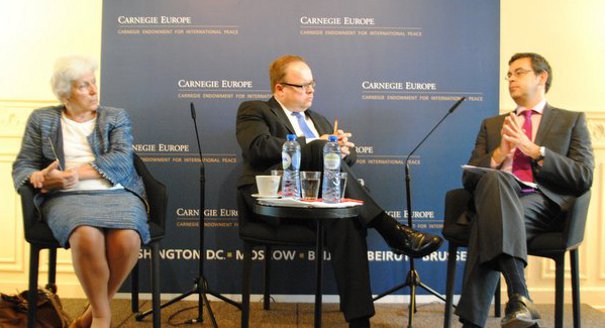Registration
Thank you!
You will receive an email confirming your registration.
IMGXYZ3747IMGZYXAs the Egyptian presidential election draws near, violent unrest continues in Cairo affecting both the political balance in Egypt and the dynamics of change in the region. With so much at stake in Europe’s evolving southern neighborhood, Carnegie scholars Marina Ottaway and Sinan Ülgen discussed Egypt’s presidential elections, internal and regional power shifts in the Arab World, and how Europe should engage the region’s new key players. Carnegie Europe's Jan Techau moderated.
The event marked the launch of Carnegie’s latest policy outlook, The Emerging Order in the Middle East.
Discussion Highlights
- Power Shifts in the Middle East: The emergence of Islamist movements as a significant social presence, coupled with the organizational capacities of these movements, is having a major impact on political dynamics in the Middle East, Techau said. He noted that emerging Islamist elites in countries across North Africa are bringing new social and ideological foundations to the fore. Ottaway added that even as the Muslim Brotherhood is gaining a stronger political presence, the secular spectrum is becoming increasingly fragmented. Techau highlighted the tenuous relationship between secularists and Islamists in countries undergoing transition, raising questions about what the lack of trust between parties means for the prospect of political reform, and what an appropriate role for the international community might be.
- Egypt in Flux: Ottaway described Egypt as being in a state of flux, able to develop in many possible directions. Although one cannot point to which way Egypt will lean, Ottaway stated that the determining factor is whether or not a government-to-opposition relationship between the major political parties can be nurtured, such as that which can be found in more mature democracies. Ottaway noted the complexity of this test, however, as Egypt faces run-off elections without agreement on an infrastructure and roadmap for constitutional reform.
- A Concrete Focus on Economic Reform: Ülgen argued that worsening economic conditions are a threat to political transitions. The Arab policy makers are aware of this danger. As a result, the area of economic governance will provide a window of opportunity for the international community to engage more clearly and effectively than with democratic initiatives. Ülgen outlined five short-term recommendations for the international community and, in particular, the European Union:
- Increase the size of financial assistance
- Assist the creation of a market-friendly legal and regulatory framework, such as with public-private partnerships in infrastructure
- Help to switch savings or debt management issues to international markets, moving them from unsustainable national bank systems to international systems
- Build partnerships at local and regional levels to foster and promote entrepreneurship
- Cooperate in setting a concrete agenda by managing and mediating expectations at not only the government level, but across a wide range of actors and stakeholders.
- Increase the size of financial assistance
